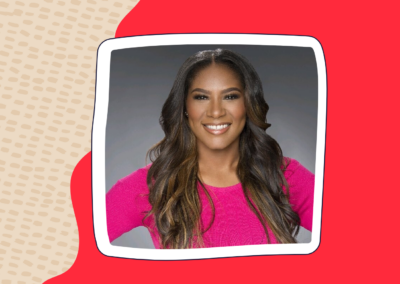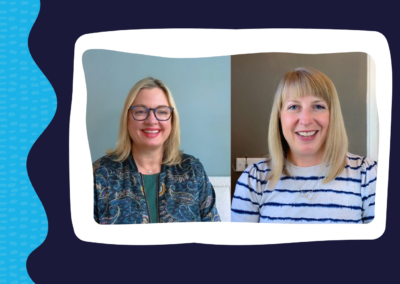Losing weight can be hard. Also hard? Marketing a new weight loss product. And in 2015, the San Francisco-based company Willpower Labs was struggling to promote its diet lozenge, MealEnders.
The company was just starting out and needed someone with experience to make high-level, strategic decisions. But they couldn’t afford to pay the salary and benefits of a seasoned, full-time CMO.
Enter Dana Doron, whose substantial marketing experience made her suitable for the role. Willpower Labs couldn’t afford to bring her on full-time, but Dana’s desire for flexible hours made her amenable to doing the job in a fractional capacity—about 25 hours a week.
Dana had sharpened her executive credentials in the San Francisco Bay area, and she’d recently developed a taste for this way of working. “When my son was born [in 2013], I wanted more stability but not a full time job,” she says. So she signed a work agreement with MealEnders which ended up lasting six years—and which led the company to skyrocketing growth.
How fractional CMOs work
Fractional CMOs are high-level executives who contractually work for a corporation for a finite period. They commonly offer their services to multiple brands at the same time, usually for a number of months or a few years. Unlike a general consulting engagement, which Dana has also done, the fractional CMO role specifically involves working at a more strategic, foundation-building level.
“When I did long-term consulting, there was a little bit more separation between me and the rest of the staff,” Dana says. “The company’s founder would act as a gatekeeper about where to use my services.” But when she works as a fractional CMO, she says, “I have a more holistic view of the brand’s needs and will get involved in every aspect of the company.”
Ever since the pandemic revealed the benefits of remote work and flexible scheduling, many marketing experts have warmed to the idea of independent contractor roles. At the same time, there’s been a boom in the number of start-up companies emerging—companies looking for high-level experience without a high-level budget.
Kate Walling, founder of the Seattle-based, tech-industry marketing consultancy Traction Hero, has worked as a fractional CMO for a number of tech start-ups. “[These smaller, newer companies] are where fractional CMO work really started happening for me,” she says. “They have massive goals for high growth, and they need to get a bunch of things done fast.”
Kate says that marketing executives who’d like to pursue fractional CMO opportunities should home in on their knowledge base and core strengths. “People hire me because they know that I understand all the pain points that tech companies experience,” she says. “I know how to use the money they have and how to direct it to fulfilling their business goals.”
If you’re interested in working with companies as a fractional CMO, there are a number of factors to consider before jumping in. Here’s a brief rundown of what companies are looking for in a fractional CMO and how you might fit into this role.
5 things you need to be a successful fractional CMO
1. High-level thinking
In many cases, a company will hire a fractional CMO because they’re not sure what they need. “They realize there’s a lack of strategy,” Kate says. “But they don’t have someone senior enough to look at the whole picture and analyze what’s working and where they should be going.”
When Dana started at MealEnders, she says, “they were starting out, and they couldn’t quite hit the ground running.” With many marketing options and a finite budget, Dana had to choose which channels to pursue to give the company the biggest bang for their buck. Because of her extensive background, she was able to make knowledgeable choices.
She launched the product on Amazon, created specially optimized Facebook ads, revamped the website, initiated pricing changes, and managed an appearance on ABC’s Shark Tank, among other strategies. Within her first year with the company, sales went from $200,000 to $1.1 million.
“My presence paid dividends over the long haul,” she says. “It’s a great example of how a fractional CMO can really take a company from almost zero to millions.”
2. Broad marketing and business expertise
Obviously, there are many aspects of marketing (such as SEO, social media, video, email, sponsorship, and events, among many others). The type of companies who tend to hire fractional CMOs are new or smaller ones, and their staffs fall short of all the experienced employees they need to fill these roles. So, the fractional CMO must have a knowledge base that encompasses all of them.
“This is someone [who] needs to have had a lot of breadth in their marketing experience,” Dana says. “Someone who only did Facebook or Google ads before wouldn’t know how to approach the overall development of a company’s marketing plan.”
And because you’ll be working with other departments as well, Kate says that the job often requires an even broader grasp of how a company works overall.
“You need to generally understand business challenges and how marketing can respond to those challenges,” she says. “When the company is in a particular mode (like problem solving or growth), you need to come up with a strategy that maps to what will work for the marketing department as well as the whole company. You need to know how to get the pulse of the customer through research and how to work with sales and product teams.”
While neither Dana nor Kate consider a marketing executive background a requirement for this role, they agree that you need a gut instinct for solving marketing problems. And that usually comes from past exposure to these problems.
3. Willingness to go it alone
Fractional CMOs tend to be executives who are used to long office hours and lots of time spent with fellow marketing team members. If you feed off of collaborating with peers in this way, think about how you’ll feel switching to remote or hybrid work—or moving to a new company with a small staff and a shoe-string budget.
“I admit that that’s something I miss,” Dana says. “Often I’m working with very junior staff, and I’m sort of the lone wolf in many ways. I miss having a high-performing team of people to work with on the marketing end of things.”
Of course, the benefits can also outweigh those drawbacks.
“The pros are that I love being part of different company cultures and seeing the differences [between them],” Kate says. “And I like the experience of not working 80 hours a week on one company. You can set your own company culture.”
Being on your own also means taking care of your own health benefits, retirement savings, and taxes. “I know people who didn’t have help understanding tax implications and how to set up software and a legal entity to help with that,” Kate says. “Then they ended up owing more in taxes than they realized. It’s a common problem that people don’t talk about.”
4. An entrepreneurial spirit
For all the frustrations of full-time work, there’s something to be said for always knowing where your paycheck is coming from.
“This [role] is not for someone who needs a huge amount of stability,” warns Kate. “Sometimes it’s stable, and there’s opportunity to make more than you would [if you worked in-house]. For tech startup clientele, it is easier in a good market when VC money is flowing. I’ve noticed a difference with more traditional SMB clients in that, depending on market conditions, SMBs may still be growing when startups are stagnant. That seems to be the case right now when tech has been hit especially hard.”
Kate says she’s had to learn how to manage when the market is in a rough patch, and sometimes it “takes a little bit longer to get the next deal.” While she can control when a contract may begin or end, she can’t predict whether a company will be around for the long haul.
“Things happen to tech companies,” she says. “You have to manage the uncertainty.” So, even when she has a full slate of clients, she says she has to use her time wisely. “I have to always be prospecting,” she says. “You’re constantly on the lookout for new clients.”
5. Enthusiasm for networking
Still interested in becoming a fractional CMO? Kate suggests that you start by taking any interesting marketing job that comes your way. This will help you in two ways. First, she says, you’ll “get yourself used to learning new industries really quickly.” And second, you’ll build your network of industry peers.
“Getting your first [fractional CMO] job is a network-heavy practice where the majority of your leads come from your network,” she says. “Let your network know what you are looking for. Typically your network will determine your first project. For me, it’s Bay Area tech companies.”
Dana cautions that the process may take some time. “With this economy, it’s been harder [to find work],” she says, “especially with high-level people being laid off and the trendiness of being a fractional CMO.”
She suggests increasing your opportunities by joining marketplaces for contractors. For example, We Are Rosie’s Flex Execs program is geared specifically to executive-level growth experts and visionary strategists, placing them into roles where they can take companies to the next level.
“Everyone who wants this work wants two things: independence and interesting projects,” Kate says. “For me, this is the lifestyle that I want to live.”



